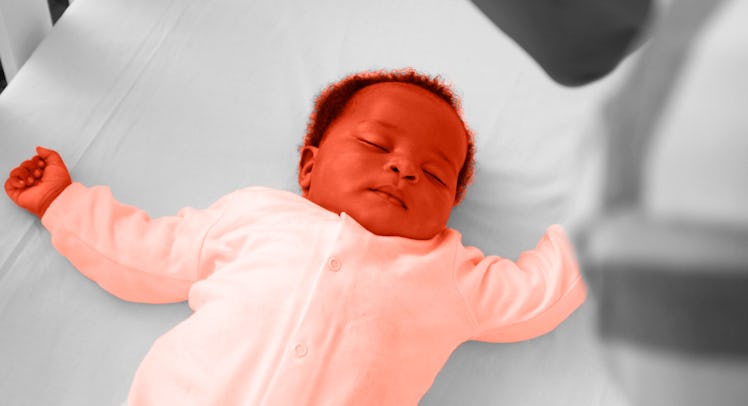3-Month-Old Baby Sleep: 5 Things Parents Can Expect
Did this baby's parents just get six hours of sleep? Yeah, they did!

In case you needed the reminder, sleep is not a luxury, it is a biological necessity. And while you may have made it this far in your adult life by routinely sacrificing sleep for more interesting endeavors, it doesn’t work that way for babies. Critical development is underway while baby is asleep, from tissue repair to the formation of new brain synapses. Newborns should be asleep more than they are awake, which makes it surprising that it’s sometimes so damn hard to get them to fall, or to stay, asleep. The whole endeavor can devolve into a vicious circle: “They end up overtired, and then they’re harder to get to sleep at bedtime, they’re more prone to overnight wake-ups, and they’re more prone to those early-morning starts as well,” says Hannah Peterson a pediatric nurse and the owner-operator of Dream Baby Sleep Consulting. Sound familiar? Yeah, it happens to adults too. Here, Peterson describes what to expect, sleep-wise, from your baby at 3 months.
It’s Theoretically Possible to Get Up Just Once at Night
As baby grows larger, he’s able to go longer without feeding, which theoretically means he can sleep longer at night. Depending on his weight at three months, he may be able to sleep for as long as six hours at a stretch, which allows parents to shift from two nighttime feedings to just one. Or at least begin to see the light at the end of the tunnel.
Consistency is Key with Resettling the Baby
Of course, hunger isn’t the only reason babies wake up at night. At three months, they still don’t have the ability to self-soothe; their parasympathetic nervous system isn’t quite there yet. New parents can start feeling desperate at this stage, trying any tactic to get baby (and themselves) back to bed. Try to stick to your normal resettling routines (Peterson prefers Dr. Harvey Karp’s 5 S’s), and not create bad habits by using sleep crutches, like letting her fall back asleep on you. Unless you want that to be the new normal going forward.
Baby’s Daily Naps Will Decrease in Number
At three months, baby doesn’t need as much sleep during the day, and parents may find three naps work better for him than four. Peterson still recommends one of those naps, typically the middle one, be a long one, 1.5 to two hours. If baby wakes too soon, remember to give him a chance to fall back asleep before socializing with him.
Don’t Be Deceived by the Adorable Baby Noises
Babies often start vocalizing at this age, making adorable cooing and gurgling noises. Mom’s and dad’s natural inclination is to coo back, which is fun for everyone — unless baby vocalizes as part of their winding down process. In which case, cooing back at them, or rushing into the room with the iPhone on record, will wind them up, not down. This one’s an easy fix: If your vocalization duets start off fun, but always seem to end in an overtired melt-down, they’re a wind-down gurgler, and you need to lay off.
It’s Never Too Late, or Too Early, to Get a Little Help
Three months can start to feel like a breaking point for new parents who are sleep-deprived and grumpy, and wondering if they’re ever going to get to sleep through the night again. Peterson says it’s never too late, or too early, to reach out to a child sleep consultant to get feedback on how to make sleep easier, for you and your baby. There’s a lot of information out there, but what works for one family doesn’t always work for another. Don’t be shy about getting personalized help.
This article was originally published on